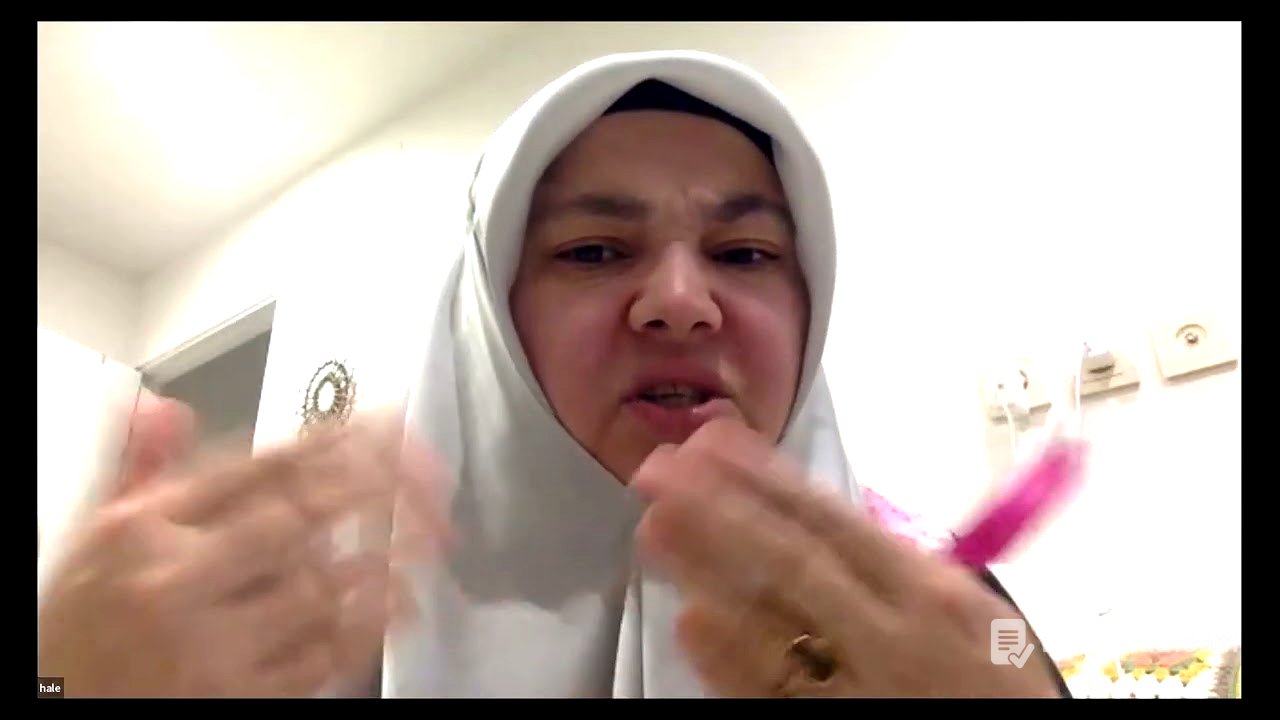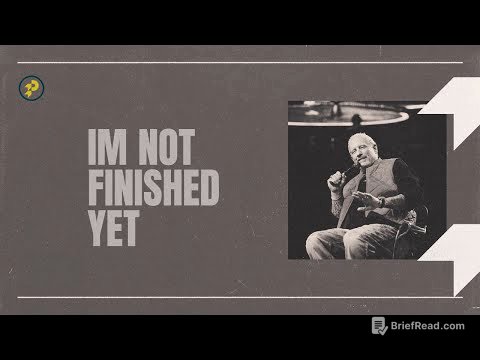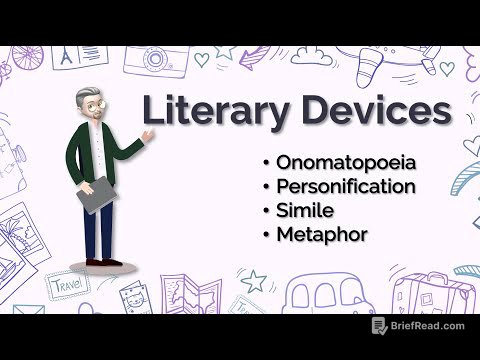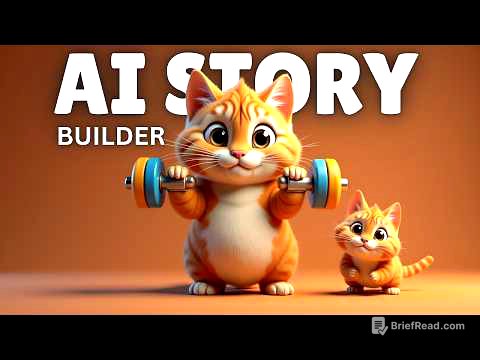TLDR;
This YouTube video delves into the creation theory from the perspective of the Quran and the Torah, examining the creation of the universe and humans, the role of causes, and the concept of the afterlife. It emphasizes the importance of understanding both religious texts and scientific findings, advocating for a balanced approach that avoids conflict between the two. The discussion also touches on the creation of Adam and Eve, the nature of paradise, and the unique aspects of the Quranic narrative.
- Examines creation theory from Quranic and Torah perspectives.
- Advocates for balancing religious texts with scientific findings.
- Discusses the creation of Adam and Eve and the concept of paradise.
- Highlights unique aspects of the Quranic narrative.
Introduction and Overview of Topics [0:00]
The video starts with a welcome and an overview of the lesson, which is the 6th lesson of the 3rd week, focusing on "creation theory and scientific approach." It references notes from a previous lesson that covered the analysis of the Quran and religious traditions, man and creation, and the illiteracy of the prophet. The speaker expresses hope that the audience will actively participate in the discussion, aiming to explain the Holy Quran and make the subject understandable.
The Meaning of Creation in Holy Books [1:44]
The lesson explores the content of holy books, particularly focusing on the theme of creation. It notes that creation is a primary subject in the Torah and the Quran, where Allah is mentioned as the creator. The discussion references the first verse revealed in the Quran, which emphasizes that Allah is the one who created. The speaker mentions that creation occurs in stages, a concept that aligns with scientific research.
Reconciling Religious Tradition and Science [3:39]
The speaker emphasizes that the Quran cannot be understood without reading the book of the universe, advocating for a harmonious approach between religious tradition and scientific research. The video addresses the creation of man from soil, suggesting that the material from which the universe was created is the same as that from which man was created. It acknowledges the possibility of both miraculous and process-driven creation, noting that science does not claim divinity.
Insights from Risale-i Nur [5:53]
The discussion references the Risale-i Nur, specifically the 22nd word, which connects creation to a creator. It mentions the 10th verse of Surah Ibrahim, questioning doubts about God in His creation. The speaker encourages careful reading of the Master's statements, comparing it to looking at the text of the Quran, to understand the unreasonableness of denial.
The Role of Causes in Creation [7:39]
The video transitions to discussing the place of causes in creation, mentioning that the teacher will read from the Masnavi-i Nuriyya about causes. The speaker revisits the idea of humans being created from soil, clarifying that the universe and everything was created from nothing, from soil. The Quran provides the most detailed information, with details in today's notes.
Quranic Perspective on Creation [9:15]
The Quran says, "We created from dust, and God breathed into its nostrils from His breath." The Quran also mentions leveling and breathing from His spirit. Science falls short here, as it cannot explain life or the soul. The Quran uses terms like "Turap" and "Arz" for earth, and describes creation from water, mud, and sticky mud.
Caliphate and the Process of Creation [12:08]
The discussion touches on the creation of humans as caliphs, suggesting that caliphate can be achieved through a process. The speaker advises thinking about the creation of the universe and humans, and how to reconcile scientific and religious perspectives. The speaker notes the importance of understanding the Quranic perspective on creation, especially in the context of modern scientific knowledge.
Similarities Between Living Things [13:16]
The speaker notes the similarity between certain animals and even some plants, questioning whether we should seek God's power there. He emphasizes the extraordinary nature of humans, created from similar elements, and called a caliph. The speaker highlights the miracle of human knowledge and the ability to transmit it, referencing the Quran's statement that God taught humans all of this.
The Significance of Human Creation [14:22]
The speaker reflects on the significance of human creation, noting that God breathed from His spirit when He created humans. He references the story of Satan, who refused to prostrate before Adam because he looked at the material of our creation and belittled us. The speaker emphasizes that God loves and values humans very much, boasting about what He created with us.
The Quran's First Revealed Verses on Creation [15:32]
The discussion shifts to the Quran's first revealed verses, which mention creation. The speaker notes that the Quran mentions man in its first verse, using the word "alaq." The speaker explores the meaning of "alaq," suggesting it might refer to Allah's interest and attention in creating man.
The Pen and the Teaching of Knowledge [18:06]
The speaker references the verse about God teaching humans to write with a pen, emphasizing that the Quran isn't just talking about the beginning of creation but the entire universe and humanity. He connects the teaching of the pen to the achievement of the caliphate, noting that the pen is a tool that encompasses the tools of knowledge.
The Repetition of Creation [19:21]
The speaker emphasizes that creation is something repeated, referencing the word "halaga" and noting that God is constantly doing this. He uses the example of human birth to illustrate that God is constantly creating. The speaker highlights that human creation does not begin with biological creation, but with a pre-stage.
The Afterlife in the Quran [21:49]
The speaker emphasizes that to understand human creation, you need to understand the heavens. He notes that the goal is to prove the resurrection, and that the Quran speaks of death and the afterlife in relation to creation. The speaker highlights that the Quran has over 900 verses about the afterlife, offering hope to humanity.
Adam and Paradise [24:31]
The discussion turns to the creation of Adam, questioning whether he was the first human and where he was created. The speaker notes that the word "paradise" appears in the Quran 148 times, and is sometimes used in reference to the garden on earth. He mentions that the Quran calls the place where Pharaoh and his entourage lived "Paradise."
The Nature of Paradise [26:54]
The speaker questions whether Adam was created in the paradise where we will go as a reward after death, or in a garden on earth. He suggests that the Tigris and Euphrates are mentioned in the Torah, and that Paradise in the Quran could be a garden on earth. The speaker introduces the miraculous nature of the Virgin Mary, referencing terms like "embete" and "seed."
Grammatical Miracles in the Quran [28:43]
The speaker discusses grammatical "errors" in the Quran, specifically in verses concerning the Prophet Mary, where both masculine and feminine pronouns are used. He suggests that this is not an error, but evidence that the text of the Quran has been preserved exactly as it was heard from the Prophet Muhammad.
Avoiding Conflict Between Science and Religion [30:59]
The speaker emphasizes the importance of not putting the verses of the Quran against science, but showing alternative interpretations. He advises never getting into arguments, and showing sportsmanship even if you don't like a view. The speaker notes that biology cannot describe how life began, and that what we call life is already a secret.
Reading from Mesnevi-i Nuriye [34:05]
The video transitions to reading from the Mesnevi-i Nuriye, focusing on the subject of causes. The speaker reads about the two types of monotheism, and the importance of attributing events to the eternal power that works behind them. The speaker emphasizes that causes are merely means preached to reveal the glory of power and the majesty of divinity.
Discussion on Causes and Tawhid [39:00]
The speaker and participants discuss the relationship between causes and Tawhid, noting that God creates everything until the causes are eliminated. They explore how events always occur for a reason, and how our mind needs an explanation. The speaker gives the example of Azrael (peace be upon him) as a veil, so that we do not rebel against Allah.
The Relationship Between Reasons and Being a Caliph [42:45]
The discussion explores whether the relationship between reasons and being a caliph necessitate each other. The speaker suggests that Allah Almighty addresses this thing not only to believers and non-believers but also to all of His creations. He notes that everyone has the chance to become a caliph, to attain that blessing, that rank.
Determinism and Monotheism [47:52]
The speaker addresses the relationship between determinism and monotheism, noting that determinism means that certain causes produce certain results. He emphasizes that we believe in the causes, and that there is someone who creates the causes. The speaker notes that there is a fine line here, and that Tawhid with determinism can be complex.
Questions and References to Seyit Hodja [49:10]
The speaker addresses questions from the audience, including whether there is no belief in the afterlife in Judaism in the Torah. He also references Seyit Hodja, who had written that the Resurrection was based on more physical foundations than physics.
Reading from the Torah: Chapter 2 [51:05]
The video transitions to reading from the Torah, specifically Chapter 2, which discusses the completion of the heavens and the earth. The speaker notes that the human element in the Torah text has been touched by human hands, and that the second chapter repeats information as if the processes mentioned in the first chapter had never been mentioned.
The Creation of Man in the Torah [54:11]
The speaker reads from the Torah about the creation of man from the dust of the ground, and the planting of a garden in Eden. He questions whether Adam was created in the paradise where we will all go as a reward, or in a garden on earth. The speaker notes that the Torah mentions the Tigris and Euphrates, suggesting that Adam was created in a region where these continents were separated.
The Naming of Animals and the Creation of Woman [56:14]
The speaker reads about Adam naming the animals, and the creation of woman from Adam's rib. He notes that the idea of a rib folding with flesh and becoming a woman is not in the Holy Quran, but is in our tradition. The speaker emphasizes that there is no such expression in the Quran, and that it most likely entered from Israelite narrations.
Surah Saat: The Creation of Man [1:00:44]
The speaker recites the Arabic version of the Quran from Surah Saat, verses 71 to 85, which discuss the creation of man. He notes that the text states that the first created being, Adam, was also the caliph. The speaker points out that the word "creation" is used in the Quran for the current creation, unlike "bedee" and "enşee."
The Story of Iblis and Arrogance [1:03:53]
The speaker discusses the story of Iblis, who became arrogant and refused to prostrate before Adam. He suggests that the first test of existence was through arrogance and pride, and that arrogance is very dangerous for humans. The speaker notes that the third chapter of the Torah mentions the woman and the forbidden tree, which he interprets as sexuality.
The Afterlife and the Testing of Men and Women [1:08:39]
The speaker emphasizes that the story of creation comes directly to hell, to the afterlife. He notes that in places where creation is mentioned in a short story, we immediately see the afterlife. The speaker discusses the testing of men and women, and the consequences of violating the prohibition.
Surah Al-Insan: The Creation of Man [1:09:18]
The speaker discusses Surah Al-Insan, noting that it mentions a period when human creation wasn't even mentioned. He suggests that this could refer to the period before biological creation. The speaker notes that the Quran immediately comes to the test of our responsibilities on Earth, and that creation, responsibility, resurrection to the afterlife, reckoning, heaven, and hell are all connected.
Surah Al-Araf: The Shaping of Man [1:12:16]
The speaker discusses Surah Al-Araf, noting that it mentions the shaping of man. He suggests that the period of shaping is consistent with science, and that the angels being told to prostrate to him also refers to a period. The speaker emphasizes the importance of avoiding conflict with science, and paying attention to denial that comes from science.
Surah Al-Hijr: The Breath of the Spirit [1:13:50]
The speaker discusses Surah Al-Hijr, noting that it mentions the breath of the spirit. He emphasizes that biology cannot explain this, and that it can only happen with the power of God. The speaker discusses the devil's meeting with our God, and the devil's belief, anger, and arrogance.
Surah Sajdah: The Perfection of Creation [1:16:37]
The speaker discusses Surah Sajdah, noting that God has made everything He created beautiful, and that He created man from clay. He emphasizes that the Quran speaks of many processes regarding creation, from creation from nothing to the form of creation, the multiplication of creation, the mother, father, or spouse.
The Soul in the Quran [1:17:36]
The speaker discusses the terms "ruhi," "ruhi," "ruhane," "our soul," and "soul" in the Quran. He notes that the term "my soul" is used for humans in two places, and that the breath of soul distinguishes us from humans, monkeys, this and that. The speaker emphasizes that the soul won't end with death either, and that it will go towards God.
The Responsibility of the Nation of Muhammad [1:20:58]
The speaker discusses the responsibility of the nation of Muhammad, noting that they are responsible for the religious traditions that preceded it, as well as possessing the final book, the text. He emphasizes the importance of bringing people together with compassion, and helping them understand the text better.
Quranic Words Related to Humans [1:24:08]
The speaker discusses the Quranic words related to humans, including "is" (work), "ins" (man), and "el insan" (el insan). He notes that the prophets are both human, and that the unconscious, the evil ones will be obstacles in your path. The speaker emphasizes that humans are created weak, and that Satan is a clear enemy to humans.
The Word "Life" in the Quran [1:27:56]
The speaker discusses the word "life" in the Quran, noting that it appears in 72 verses. He references the Battle of Badr, and the word "hayye" is used to describe whoever died for their faith, their morality, their honesty, and for praising the name of Allah.
Surah Noah: The Stages of Creation [1:30:34]
The speaker discusses Surah Noah, noting that the word "embete" (embet) appears like a plant. He suggests that humankind was created through such and such stages in a process, and that there are narratives and expressions in the Quran that imply those stages.
The Creation of Man from Mud [1:33:45]
The speaker discusses the creation of man from mud, noting that the Quran might also mention creation in the womb, that it is miraculous and created by God. He emphasizes that the Quran speaks of many stages of creation. The speaker concludes that you and I are products of stars, and that their elements are what we call mud there.
The Name Adam in the Quran [1:36:11]
The speaker discusses the name Adam in the Quran, noting that it appears 25 times. He suggests that Adam could be the first human, but that there are many people on earth. He was chosen from among them, chosen, in other words, revealed.
The Garden of Adam and the Word Paradise [1:37:39]
The speaker discusses the Garden of Adam, noting that it mentions four rivers, including the Tigris and the Euphrates. He suggests that Adam was created on Earth, and that the word paradise is used in the Quran with the plural form of y, meaning paradise, jannah, jannat, and jannatayn.
The Nafs-i Vahide and the Creation of Woman [1:40:42]
The speaker discusses the nafs-i vahide (unified self), noting that the Quran never draws the conclusion that a man created woman from a man's rib. He suggests that the opposite seems more likely, as if He first created the female, and then the man.
The Subject of Herma and the Virgin Mary [1:42:44]
The speaker discusses the subject of Herma, noting that Mary was created like a plant. He suggests that the Virgin Mary may also appear in the future centuries or 50 years later, and that the guys who do this job will say, "Wait a minute, brother."
Warnings and Conclusions [1:47:02]
The speaker provides warnings, emphasizing the importance of getting rid of the idea that if you don't think like me, you will be denying the Quran. He notes that the education method of the East is to copy the teacher, but that inquiry-based children's research is more decisive here. The speaker emphasizes that we should not suppress questioning in children, and that repression turns into atheism.









